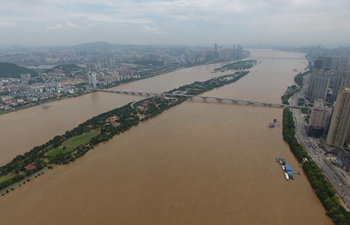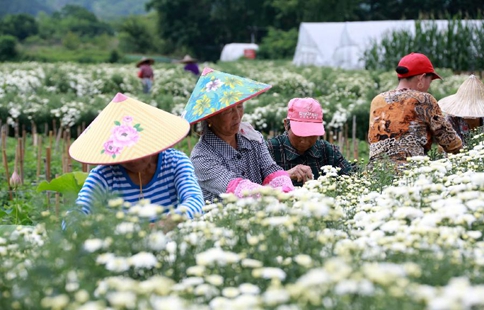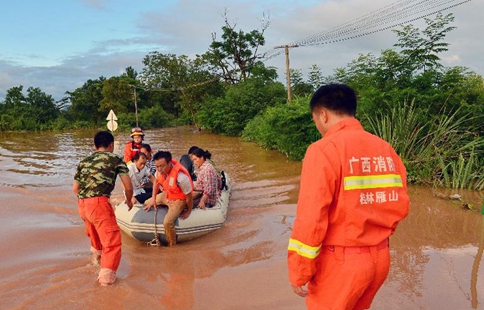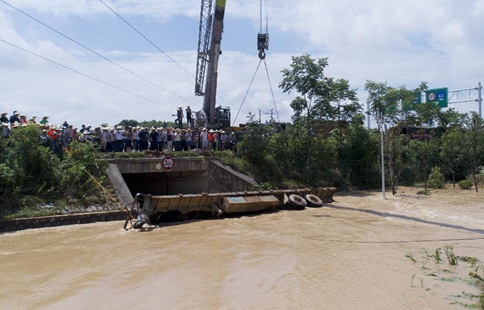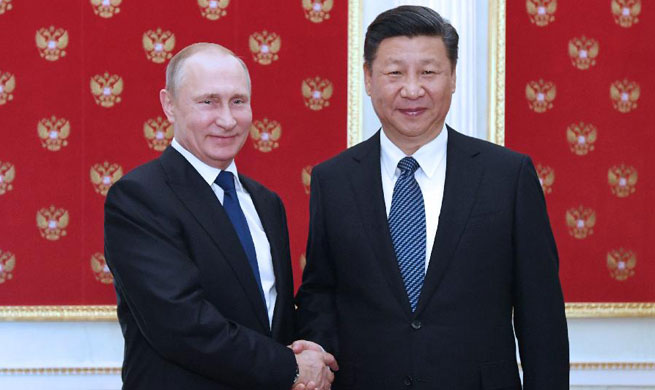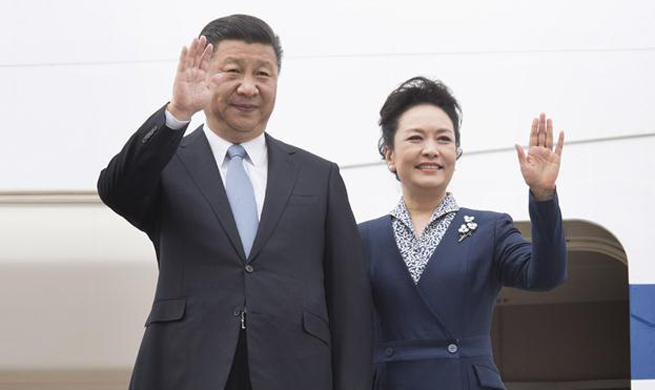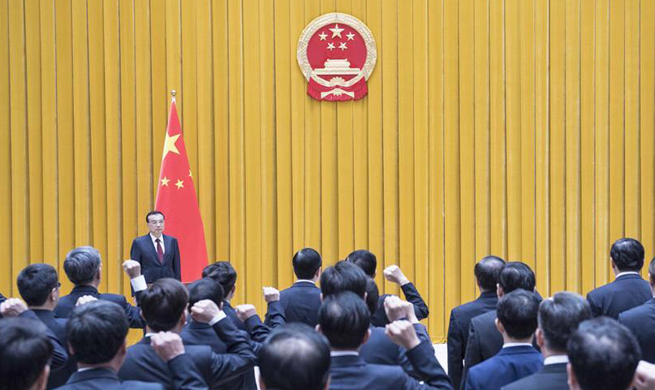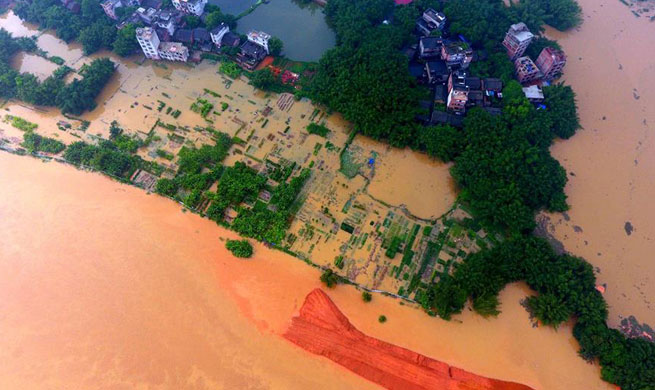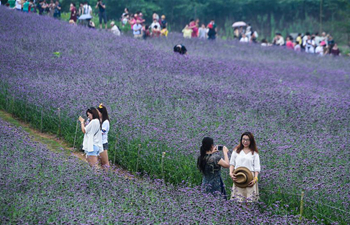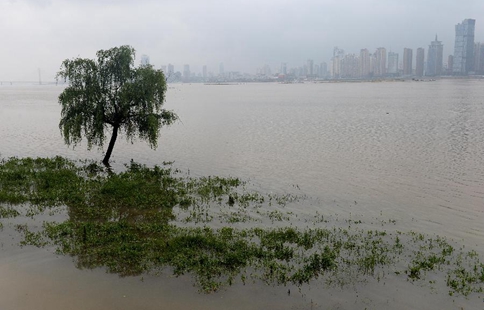By Yoo Seungki
SEOUL, July 4 (Xinhua) -- A South Korean lawmaker of one of the opposition parties said that the new government under President Moon Jae-in would need time to thoroughly investigate into any possible illegalities in the process of deploying the U.S. Terminal High Altitude Area Defense (THAAD) missile interception system.
"I'll tell you this from the perspective of an opposition lawmaker. I oppose THAAD (in South Korea). I have claimed the repealing of the THAAD deployment (decision)," Kim Jong Dae, a member of the minor progressive Justice Party, said in an interview with Xinhua Monday.
Despite his clear opposition to THAAD in South Korea, Kim said a top priority must be placed first on coming to the bedrock of the deployment decision as it was decided upon by a small group of top-level military officers, which he estimated included Kim Kwan-jin, former top security advisor to impeached President Park Geun-hye.
Some of defense ministry officials told the lawmaker that the THAAD deployment decision was led by a clandestine group of elite commanders, called poisonous snake, who studied in the military academy in Germany.
South Korea's military allows one or two excellent students of its military academy per year to study abroad. After graduation, those who studied in Germany usually get a high-level post of the military.
The lawmaker said how to deal with the THAAD issue could be considered after finishing a thorough investigation into the possible procedural illegalities.
Kim said he encouraged the newly appointed vice defense minister, Suh Choo-suk, to visit the Soseong-ri village in Seongju county, North Gyeongsang province, where a part of the THAAD battery was installed.
On June 27, Suh met with residents at the village, making his sincere apology to them for the previous government's unilateral push for the U.S. missile shield installation. Suh promised to continue communications and consultations with the residents for any further deployment procedure.
"Communications (with residents) must become a top priority. Even though the THAAD is a very significant security issue, THAAD cannot be placed above people," said Kim who had long been a military commentator since he served as an aide on military affairs to late President Roh Moon-hyun.
Kim, who became the first-term legislator in 2016 of the Justice Party, has long been an anti-THAAD protester and helped Seongju residents fight against the U.S. missile defense system.
Seoul and Washington announced an abrupt decision in July last year to deploy one THAAD battery in southeast South Korea. The deployment site was altered in September of the year into a golf course in the Soseong-ri village.
Residents in Seongju county and Gimcheon city, which borders the county and faces the THAAD's super microwave-emitting X-band radar, have held a candlelit rally every night since the deployment decision was announced.
In defiance of the protest rallies to demand the reversal of the decision, two mobile launchers of the U.S. weapons system were delivered in the middle of night to the golf course on April 26, around two weeks before the presidential by-election that was caused by the impeachment of Moon's predecessor.
A THAAD battery is composed of six mobile launchers, 48 interceptors, the AN/TPY-2 radar and the fire and control unit. Four more launchers were transported to a U.S. military base near the golf course, but it was not reported to President Moon who took office on May 10.
"I cannot help getting suspicious of any other political purpose behind the hurried push for the THAAD deployment as the installation process did not consider any military rationality," said Kim.
According to the Justice Party lawmaker, the U.S. strategic asset worth about 1 billion U.S. dollars has been operated non-strategically as the THAAD's mobile launchers in the golf course were "on display like a chimpanzee in a zoo" without any camouflage net or cover and concealment.
It mainly stemmed from South Korea's environment law, under which any construction of a military base to dig into the earth more than 0.5 meters below is not allowed without the environmental impact assessment.
President Moon has ordered a thorough investigation into the unreported delivery of part of the THAAD elements, vowing to follow a democratic procedure in any further deployment of the U.S. anti-missile system in his homeland, including the green audit.
To find any solution to the THAAD issue, the lawmaker said, the Moon government would need time as any solution can be found only after figuring out why the THAAD deployment was hurriedly pushed by the previous government.
"It was not an acceleration (of the deployment), but a high-speed accident. A top priority must be placed first on coming to the bedrock of the accident. And then, any solution can be found," said Kim.
Touching on the U.S.-South Korea summit meeting in Washington last week, Kim said it was "very good" in relations between the two countries from the "abstract" perspective though details on how to deal with sensitive issues have yet to be agreed upon.
President Moon visited Washington to hold his first summit meeting with U.S. President Donald Trump for two days from Thursday. The two leaders took the opportunity to establish a personal bond and build trust through the meeting, Kim said.
According to the joint statement released after the meeting, President Trump supported South Korea's "leading role" in fostering an environment for peaceful reunification of the Korean Peninsula.
The leading role, the lawmaker said, indicated the new South Korean government's intention to push for dialogue with the Democratic People's Republic of Korea (DPRK) separately from the dialogue between the United States and the DPRK.
The talks between Moon and Trump were meaningful as the U.S. side guaranteed an active role South Korea could play in turning the phase of sanctions and pressures toward the DPRK into a dialogue phase, the lawmaker said.
He said the principle of action in return for action, which President Moon mentioned, would be desirable to approach the DPRK's nuclear issue, noting that if Pyongyang freezes its nuclear program, South Korea can take corresponding measures such as the scaling down of the U.S.-South Korea joint war games and the U.S. strategic assets mobilization.
Kim said the strategy of sanctions and pressures on the DPRK failed as it lacked diplomacy and dialogue. Following the sanctions-oriented strategy, dialogue should have ensued to make it successful, he noted.
To open a dialogue phase on the Korean Peninsula, Kim said, the six-party talks should be restored and the dialogue platform should be developed into a multilateral one to discuss regional security issues.
The six-party talks which involves the two Koreas, China, the United States, Russia and Japan, have been suspended since late 2008.
"The six-party talks should be restored to freeze North Korea (DPRK)'s nuclear program through negotiations. The talks should be developed, in the end, into a multilateral platform to discuss security issues and strengthen security cooperation in Northeast Asia," added Kim.




